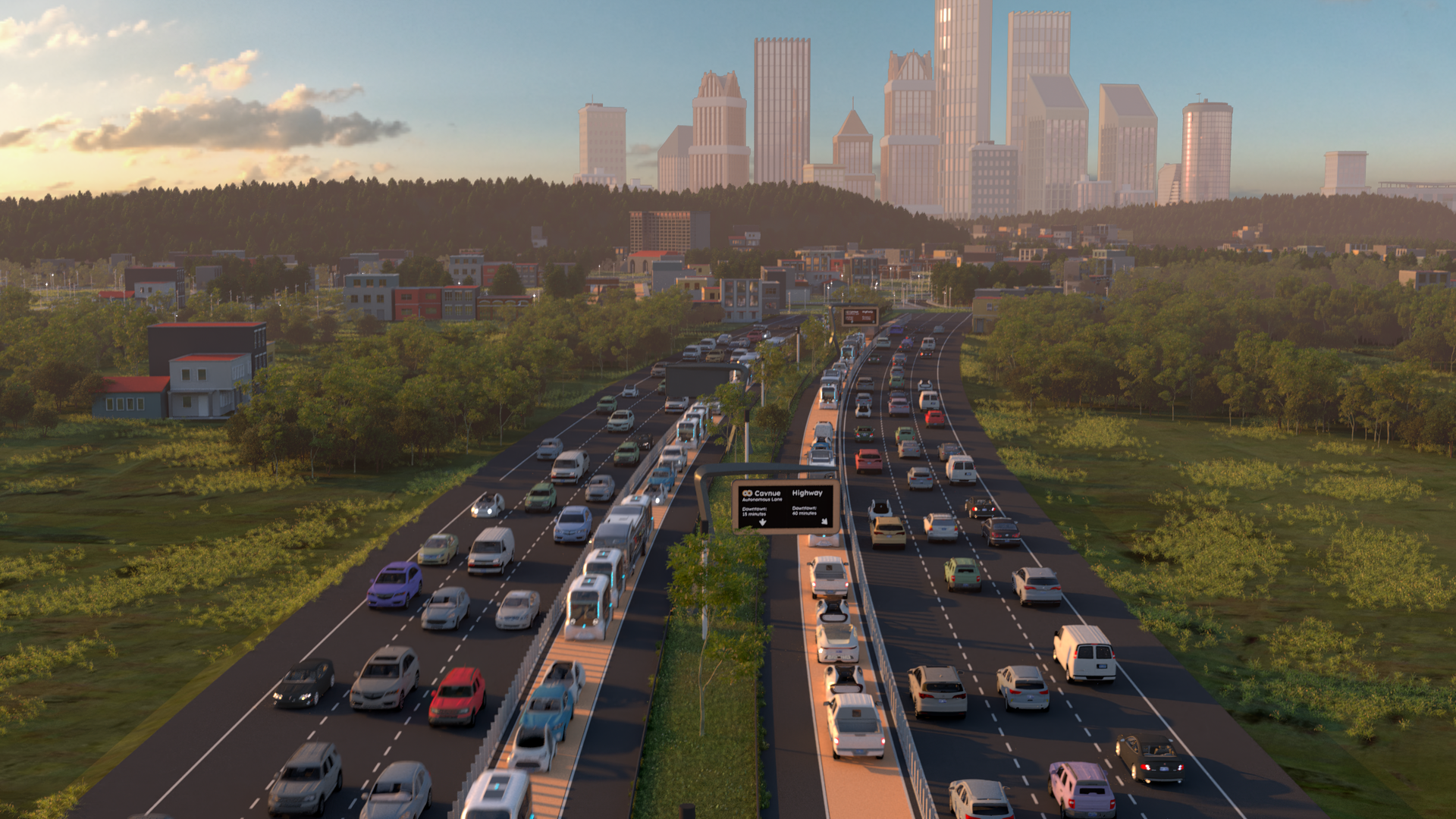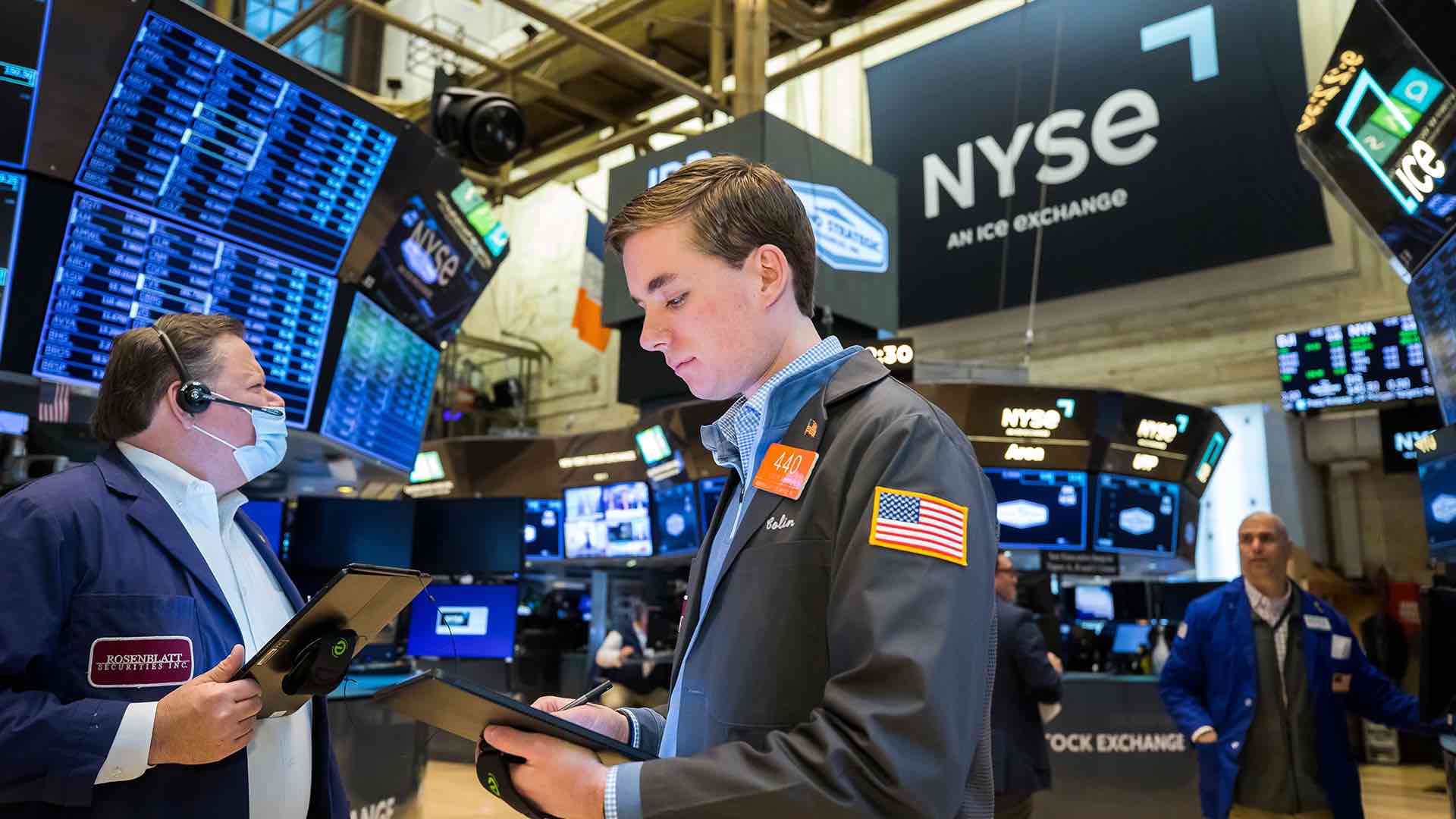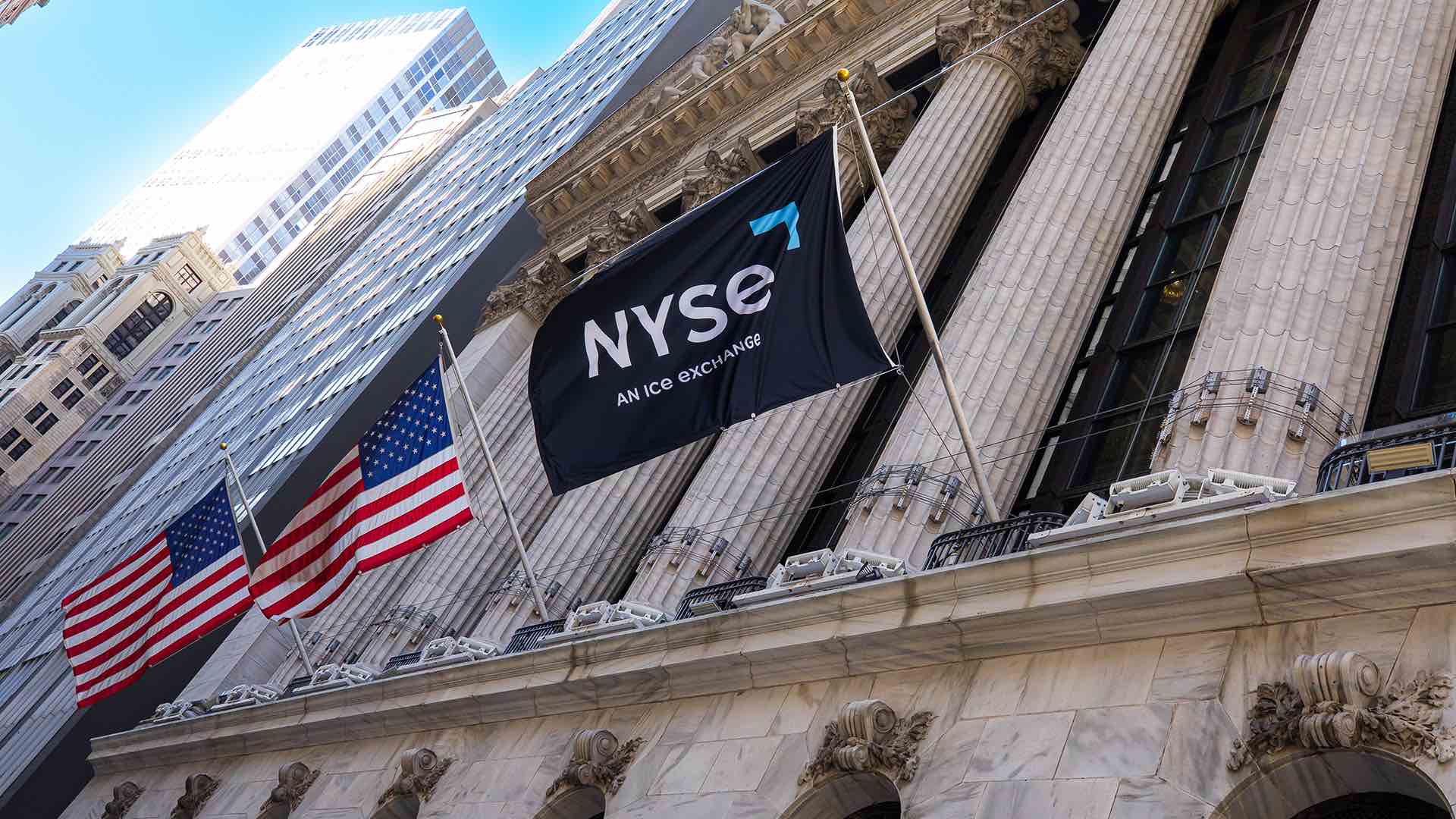| | | | | | | Presented By NYSE | | | | Axios What's Next | | By Jennifer A. Kingson and Joann Muller · May 04, 2022 | | Roads are getting smarter, the rich are getting poorer and worlds are colliding in the metaverse. We explain it all below. - If you see new tech in the wild, send us a photo or an email at whatsnext@axios.com.
- Join Axios Pro's Megan Hernbroth tomorrow at 12:30 p.m. ET for a live discussion decoding the current state of the climate industry, featuring the director of the Department of Energy's Loan Programs Office Jigar Shah. Register here.
Today's Smart Brevity count: 1,178 words ... 4½ minutes. | | | | | | 1 big thing: Express lanes for hands-free driving |  | | | Rendering of a CAV corridor for highly automated vehicles. Image courtesy of Cavnue | | | | One way to speed the adoption of self-driving vehicles is to give them automated express lanes, where they can zip past regular traffic without having to tangle with human-driven cars. Why it matters: For all the billions companies are spending to develop automated vehicles, very little has been done to prepare U.S. roadways for these advanced cars, trucks and buses. - That's starting to change, as business and government leaders turn their attention to new digital infrastructure projects.
Driving the news: A startup company, Cavnue, just raised $130 million in Series A financing to build the nation's first network of connected and automated vehicle (CAV) corridors, starting in Michigan. - These CAV corridors would have roadside sensors that could communicate with modem-equipped vehicles, advising them of road conditions up ahead, such as deteriorating weather, road construction or even potholes that pop up during rush hour.
- The company's investors all have an interest in the future of roadways. They include a high-tech infrastructure company (Sidewalk Infrastructure Partners), a global carmaker (Ford), a freight logistics provider (Landstar) and a global toll road operator (Globalvia's Openvia).
The big picture: There's more attention on intelligent roadways since Congress passed the bipartisan infrastructure deal last November, opening the door for more federal funding of smart roads, Laura Chace, CEO of ITS America, tells Axios. - Companies are working on a variety of technologies, including systems that warn cars about pedestrians (and vice versa), for example, or that use AI and predictive analytics to manage traffic more efficiently.
Cavnue is the first to focus on designing dedicated roadways for connected and automated vehicles, CEO Tyler Duvall tells Axios. - Unlike other infrastructure companies that operate private toll roads, Cavnue is partnering with state and local governments to deploy the systems.
- Its first project, with the Michigan Department of Transportation, is a 25-mile segment of Interstate 94 near Detroit.
Initially, the CAV corridors would be available to a mixture of cars, but eventually they would be restricted to partially or fully automated vehicles. - Those with Level 2 hands-free assisted-driving systems, like Cadillac's Super Cruise or Ford's Blue Cruise, would allow drivers to take their hands off the wheel and their eyes off the road while traveling in that chute. (On today's highways, the systems require drivers to pay attention.)
- In the future, fully autonomous cars, trucks and buses would travel at steady speeds in the CAV corridors without any human interaction.
- The corridors would have "dynamic pricing," depending on the time of day or use case, and motorists would be billed monthly.
Share this story. |     | | | | | | 2. The rich get poorer |  Data: Realtime Inequality; Chart: Baidi Wang/Axios If your income is rising much more slowly than inflation, that's a sign you might be rich, Axios' Felix Salmon writes. Why it matters: The bottom 90% of earners are seeing their incomes keep up with inflation, while the bottom 50% had wage gains 3.4% bigger than inflation in the first quarter of 2022. That's according to Realtime Inequality, a project that attempts to disaggregate growth statistics by income percentile. By the numbers: Real income for the bottom 50% rose by a stunning 11.7% in 2021. The top 1% did even better, seeing their incomes rise by 12.7% last year — thanks in large part to soaring markets. - In the first quarter of 2022, wage gains for the bottom half continued — but a sluggish market meant that rich folks' income growth turned negative.
The bottom line: Wage inflation is good for workers and bad for the rentier classes. |     | | | | | | 3. EV incentives are going to the wrong buyers |  Adapted from DOE; Note: Includes fully electric and plug-in hybrid models; Cartogram: Axios Visuals Electric vehicle sales growth is highly uneven, and an analysis argues this limits the climate benefits of federal purchase subsidies, Ben Geman writes in Axios Generate. The big picture: EVs made up over 12% of new light-duty vehicles registered in California last year, and over 7% in Oregon, Washington, Hawaii and D.C., per the Energy Department. - Uptake is much slower in states where people drive long distances.
Why it matters: A new analysis by the nonprofit Niskanen Center notes that EVs aren't yet catching on among drivers who use the most gasoline. - The White House wants to ramp up EVs to 50% of new car sales by 2030.
What they found: If all those new EVs went to "super users" — the top 10% of drivers who account for a third of gas use — it would displace 170 billion gallons of gas by 2030, per Niskanen. - That's 10 times the same uptake among "super progressives" — wealthier, more urban buyers who tend to drive efficient cars anyway.
What they're saying: If purchase incentives were linked to miles driven, they'd get more climate bang for the buck, Niskanen suggests. Go deeper: Read the analysis. |     | | | | | | A message from NYSE | | Dream bigger | | |  | | | | Tech companies have raised more capital on the NYSE than any other stock exchange. Together all our listed companies form a community committed to innovation, good governance and societal impact. Vision can become a reality on the NYSE. Learn more about listing. | | | | | | 4. The many worlds of the metaverse |  | | | Illustration: Sarah Grillo/Axios | | | | It's not clear if the metaverse is one world or a word meant to include all of the distinct virtual places being created by different projects. The answer will have big implications, writes Brady Dale, author of Axios Crypto. Why it matters: A lot of folks spend an ungodly amount of time online already. But technologists believe we will spend even more once they make it extra immersive using 3D, super-social worlds to shop, see concerts, attend conferences and more. The intrigue: If every big crypto community shared one virtual world, they might become a whole greater than the sum of its parts. Someone might enter to check out one community and wander over to another. What's happening: Illuvium, a game that word on the street says has a lot of top-tier gaming talent behind it, announced prices for an upcoming land sale this week. How it works: A lot of people ask how land in an infinite universe can be valuable. The answer: proximity. It's not how much land there is, but the limited space near popular areas. - The U.S. has both a ton of empty land and some of the most expensive real estate in the world. The metaverse is no different. It's "location, location, location" there too.
Brady explains the metaverse. |     | | | | | | 5. Shark Lady survives on a Forever stamp |  | | | A Forever stamp featuring Eugenie Clark. Photo courtesy of USPS | | | | The U.S. Postal Service is honoring ichthyologist and oceanographer Eugenie Clark, the founding scientist behind Sarasota's Mote Marine Laboratory, with a Forever stamp, Ben Montgomery writes in Axios Tampa Bay. Driving the news: The stamp will be unveiled today, on what would've been Clark's 100th birthday. She died in 2015. Why it matters: Known as "Shark Lady," the insatiably curious Clark made landmark contributions to marine science for 50 years on hundreds of dives around the world, but always returned to Mote. The U.S. Postal Service says Clark "spent her career working tirelessly to change public perception about sharks." - "She demonstrated that lemon sharks could be trained to do complex tasks, disproved the notion that some shark species must keep swimming in order to survive, and debunked myths about sharks as vicious, fearsome creatures," the USPS said in a statement.
- "She also made significant contributions to the study of hermaphroditism in fishes, discovered several fish species, and even found that one species naturally repels sharks."
Of note: The Postal Service chooses 25-30 commemorative stamps a year, out of a pool of as many as 30,000. |     | | | | | | A message from NYSE | | 5 questions, powerful insights | | |  | | | | The NYSE spoke with today's tech leaders to ask them five questions about the future. Hear their insights on key trends impacting society, what business leaders should be prioritizing, ESG issues dominating the corporate agenda and more. Watch The Future in Five. | | | | Was this email forwarded to you? Get your daily dose of What's Next magic by signing up for our free newsletter here. |  | It's called Smart Brevity®. Over 200 orgs use it — in a tool called Axios HQ — to drive productivity with clearer workplace communications. | | | | | | Axios thanks our partners for supporting our newsletters. If you're interested in advertising, learn more here.
Sponsorship has no influence on editorial content. Axios, 3100 Clarendon Blvd, Suite 1300, Arlington VA 22201 | | | You received this email because you signed up for newsletters from Axios.
Change your preferences or unsubscribe here. | | | Was this email forwarded to you?
Sign up now to get Axios in your inbox. | | | | Follow Axios on social media:    | | | | | |










No comments:
Post a Comment